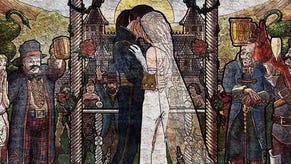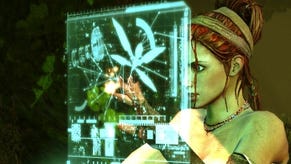Black & White 2
Molyneux rights the wrongs of the past.
Say what you want about Peter Molyneux; there's no denying he's honest. Especially when asked what he thinks about his pseudo strategy title, Black & White, four years after its release.
"It had really, really really terrible, awful tutorials," he admits. "The creature itself was broken, you couldn’t really build things and people really wanted to build things, there weren’t enough objectives in the game, the story couldn’t reflect what you'd like. The list goes on."
As designer, programmer, co-founder of Lionhead Studios and even now OBE, Molyneux can afford this sort of candid admission, especially when there have been several years of retrospection. But that doesn’t stop it from being a surprising admission, smiling openly as he talks to us about his newest foray into the god/strategy genre, Black & White 2. And it's clear that for this sequel, he isn’t prepared to make the same mistakes twice.
Shades of grey
"It's massive, I mean, everything is changed," continues Molyneux. "There are some things that are similar, but the way the game is controlled, what you do, the fact we've mixed real-time strategy stuff in, the city building - it's a completely different game, but in the same sort of universe.
"There are a lot of things, compared to what was wrong with Black and White. A lot of people [looked at] the original turned around and said 'oh, I wish the game has this, I wish the game had that' and it's going to be hard to say that about Black & White 2, because it's got everything we said it's going to have."
Another bullish statement, but as we watch the game unfold in a demonstration, it's difficult not to be optimistic about the potential Black & White 2 holds. The engine from the first game has been rewritten entirely from scratch, and this time aims to provide a much more rounded experience. Gone is the relatively limited and directionless backbone of the original. Instead, welcome a mixture of both full-on God game ethics with a heavy dose of real-time strategy formula that forms the basis of Lionhead's newest effort, along with a much clearer moral conflict.
Your choices in the game reflect the side you eventually control; either a benevolent God who creates prosperous societies and improves the quality of life for its people, or a vengeful deity who forms armies and smites anyone who gets in the way of conquest - be it of land or civilisation. Boiled down, the latter path forms a more belligerent RTS, while the former route adopts a city-building bias where creating a veritable utopia will eventually have people flocking from other cities to migrate to yours. Think of it as a knowing mixture of Populous, Sim City and Dungeon Keeper, and you're probably not too far wrong. And somewhere in the middle will be you - at least at the start of the game, before your style of play starts slanting towards the more passive or aggressive way of domination.
Animal magic
Then there's your creature, the personalised figurehead and draw of Black & White. The AI pet that existed as a reflection of your deeds from the first game has of course returned, but this time it's a more pliable companion. Starting off independent of your actions, the creature (who will once again have a range of adaptable looks in its cow/wolf/ape/lion form) acts in whatever fashion it wants - running around, helping people, picking up trees, dumping excrement on enemy buildings, occasionally eating passers-by - and you're given the chance to encourage or punish its actions. From that point, it will choose its activities more carefully, knowing your eyes are ever watching and your hand is ready to react. Further from that, you can assign it roles, such as a gatherer, entertainer, builder or soldier. That will remain the creature's function until you tell it otherwise, teaching it discipline... but it also means the creature eventually loses its sense of free will and becomes an initiative-lacking drone, waiting for the next order in its respective duty.
In being more intelligent than previous iterations (Molyneux struggles to quantify just how much each creature can do, given its vast persona and range), your minion develops a personality with all the quirks of your behaviour, complete with random traits that naturally threw up some unexpected elements during development. "There are surprises all the time," Molyneux explains. "From generally surprising behaviour to cataclysmic 'bugs'... for about a two-month period the creatures would become psychotic and totally destructive and when they got angry they'd just literally smash everything - other creatures were absolutely terrified to the point they'd hide in trees. It wasn’t really a proper bug as such, it was just the way that creature's mind worked."
Another example is offered, in which a tester decided to "toughen up" his creature by grabbing its teddy bear and repeatedly setting it alight, putting it out of reach and generally behaving like a bastard to the point that the creature would be emotionally scarred. Which in turn made it a horrifically angry and brutal beast. Not great for protecting citizens, true, but handy if you decide to put it as a unit in your army for fighting - an option for those looking to tread the Dark path in Black & White 2. Your creature can lead your forces into battle or just fight along side them at your request, with proper strategies, formations and movements for attack. Whether or not it does well naturally depends on how you've brought it up (or how many times you've burnt its beloved teddy bear, natch).
Destroy all humans
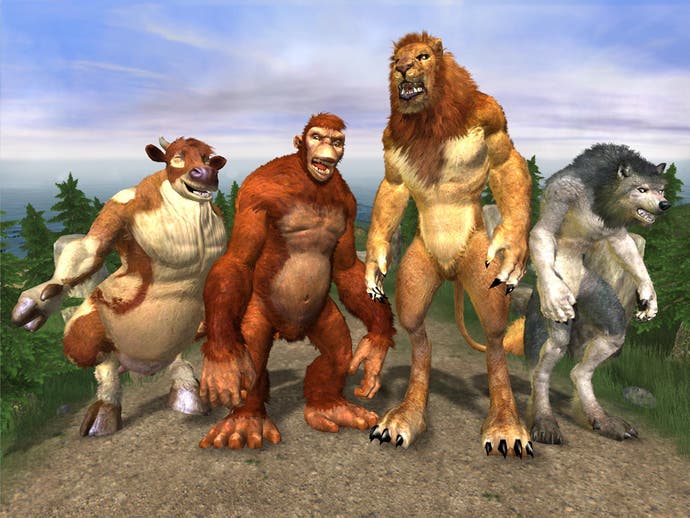
So, onward to battle. When regarding the more aggressive RTS mantra that can be taken up in Black & White 2, Molyneux - much like one of the game's creatures - gets equally riled. "For me, the RTS genre hasn’t really expanded much since its initial conception; I think because a couple of reasons. One is the way that we play RTS games has stayed basically the same; go out, build a base, create units, attack. Other than a few examples I don’t think it's ever been stretched further. What it really needs is for RTS to combine with other things, and we've seen that with action games mixing with other genres like role-playing games, so why not mix RTS and god games? And for us, it seemed like a resolution and evolution."
Which means even though the roots of RTS are there, it's not quite as simple as just taking up arms and drafting your men into a fighting force. Doing such has a generally demoralising effect on your people, changing the cities you've spent building into a more desolate, hellish place. The surrounding areas will smoulder, citizen lifespan will reduce and the mere travel of your virtual God-hand will bring chaos and crack the ground (in comparison to being a pleasant city-building God, where flowers and trees grow at your mere touch).
If you're still not discouraged and want to crush your enemies, see them driven before you and to hear the lamentation of the women, you'll be pleased to find there's no frequency cap on your units. In the demo we were witness to, Molyneux said there were some 50,000 people living in the city he built, which potentially translates into 50,000 bloodthirsty militia, ready to pillage and plunder, each said to be blessed with a personality of their own and names randomly taken from your mail/messenger contact list. That alone should bring up a few extra layers of moral implication for you and your beast to chew on...
The world is yours
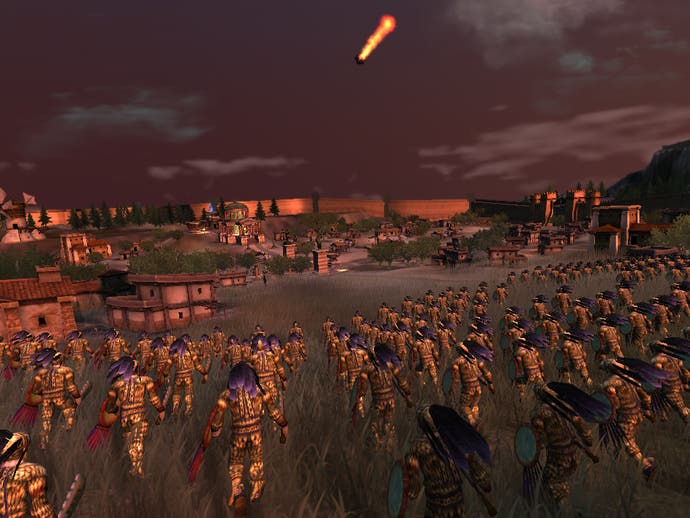
Those of a more peacekeeping persuasion can stick to a more economic campaign across the ten different worlds that exist in Black and White 2. Population growth, industry and expansion allow your citizens to thrive, play, dance and frolic; shiny happy people having fun. Instead of warlike buildings like torture pits, retirement homes and temples become options and immigrants from different races will create their own type of structures and thus set up separate areas of cultural diversity. It's hoped Black & White 2 will offer something close to the sort of depth typical to what we're used to seeing in Sim City, albeit in a more magically archaic setting, mixed with the sort of Godly acts from Populous; full blown elemental spells, along with volcanoes, hurricanes and other weather conditions (natural and unnatural) to help or hinder.
Thankfully, controls should be kept simple enough to make all this city-building, unit-gathering and organisation a manageable task, using basic mouse clicks to choose villagers for duties, creating magic, forming settlements, creating movement flags and selecting location points to tell your people where to go/investigate/attack. The desire to throw away the constant need for menus is clearly evident in Black & White 2's ability to just pick things up, copy and create just using the mouse. There's little grid-based formation, but rather a sense of almost painting the town in your image across the landscape. Move, click, hold, drop. Hopefully it should be as intuitive as it sounds.
What was already clear was the sheer beauty of it all. Black & White 2's detail is vast and teeming with life. Without the constant arguments over what's deemed good enough to be classed 'next gen' visuals or not (something the new consoles will have to suffer for a short while yet) the PC can just get on with providing luscious eye-pleasing graphics, and Lionhead's game is stunningly beautiful so far. Vast overviews can be chosen when surveying your kingdom, but there's an option to zoom right into the land and pick out individual blades of grass, complete with their own little insect habitants. And most of what you see reacts to the physics of the game. Vegetation singes under intense heat but sinks and flicks from water, and the citizens of your civilisation respond in their own way to life's little challenges too. It's all designed to give the game an striking coherence, but not without the sheer visual spectacle that comes with it. So far, Lionhead's game impresses on both a gameplay ambition and presentational level.
Black (PS3), White (360) and grey (PC)
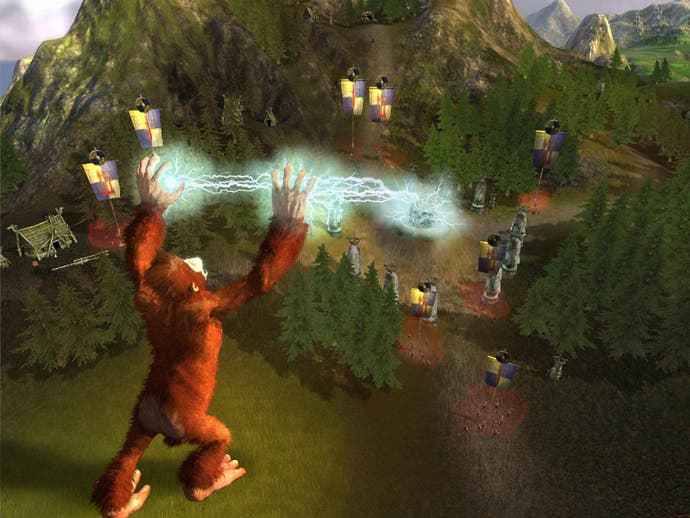
All of which brought a couple of prominent questions to mind. The first being the kind of spec needed to run all these wonderful features that make the game. Molyneux is adamant that if you've bought a machine in the last year, Black & White 2 should run on it just fine. "One of the first things we wanted to express with the game is that your minimum spec can be low, so for the game it's about what it was a year ago for say [the minimum was for] Half-Life 2, so it's reasonable."
Fair enough, given Valve's game was hardly an unpopular reason for system expansion. But for those looking a bit wider, comes the second question: how easy would a next generation console version be? This time Molyneux's a bit more careful with his wording. "Technically... it would be easy to do," he nods. "The machines [Xbox 360 and PlayStation 3] have the power to do Black & White 2. The only problem is the control. We'd have to go right back to the drawing board, as we've not got a mouse. What we did with the mouse is say, 'we've got 2 buttons, a middle wheel and that's it' - we haven’t got a keyboard (in theory, although we have shortcuts). If you're going to do it on the next generation machines, we have to take a new look. It's the freedom of picking stuff up with a mouse, and you have to change it. We're thinking about it though."
When pushed as to how far this thinking has gone, he smiles, pauses and eventually declares "a month... not very long." But then goes on to confess that Lionhead has got dev kits which are also being used for "other games." Which ones he wouldn’t verify, but it seems as much a confirmation to a Fable sequel as we're going to get; although it's more than possible the PS2 and Xbox versions of The Movies may get shuffled along to their next gen offspring too. As for the current Lionhead RTS/God game in question, we certainly wouldn’t bet against it given Molyneux surprisingly lucid answer, not to mention the close ties between the company and Microsoft.
The proof pudding
Regardless of whether we'll see a PS3 or Xbox 360 version of Black & White 2, it's obvious a lot of work and thought has gone into making it a far more pleasing and rounded title than its forebear. Although there will be a fair few casting a sceptical eye, given the frequent dangers of erroneous promises often falling beneath the hard boot of reality.
But what was shown will have soothed fears a little. Firstly, the game is set for an early October release and is very close to completion, which means all the features seen so far are currently implemented and working. Providing no large gameplay imbalances, we expect there to be little hyperbole that Lionhead can't fulfil already. More importantly, the impressive nature of Black & White 2 comes from not just a combination of what the gameplay will bring in terms of freshness and longevity to two genres (even a multiplayer mode will be implemented to allow a diversity of play across city building and RTS army building), but Lionhead and Molyneux's willingness to express that what the sequel has over the original is more of a structure, more of a focus... and ultimately, more of a game.
"I think what it is, is that Black and White was far more of an experiment than it was a game," Molyneux concludes. "It started as an experiment, while Black & White 2 started as a game. We sat down with Black & White 2, and said 'right, these are the terrible things we committed with Black & White'. We're going way beyond what people were expecting for Black & White 2."
Black & White 2 is due for a late September/early October 2005 release on PC.


